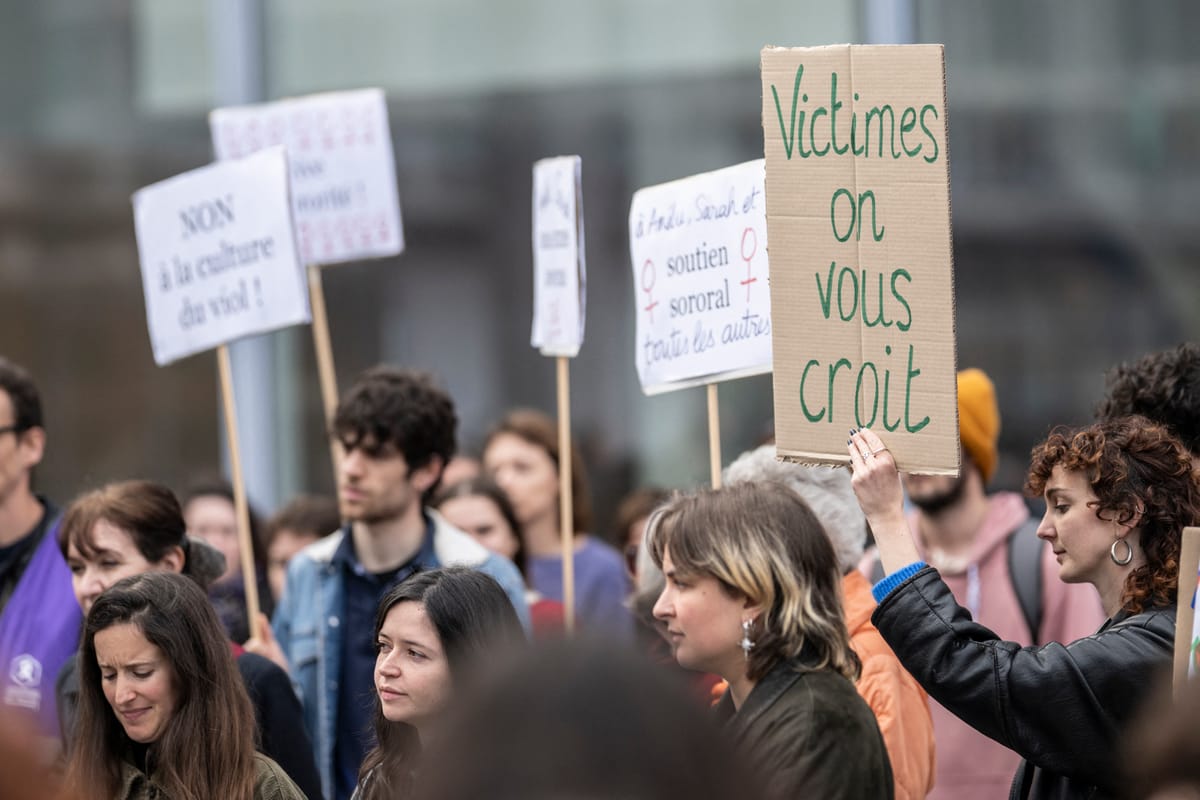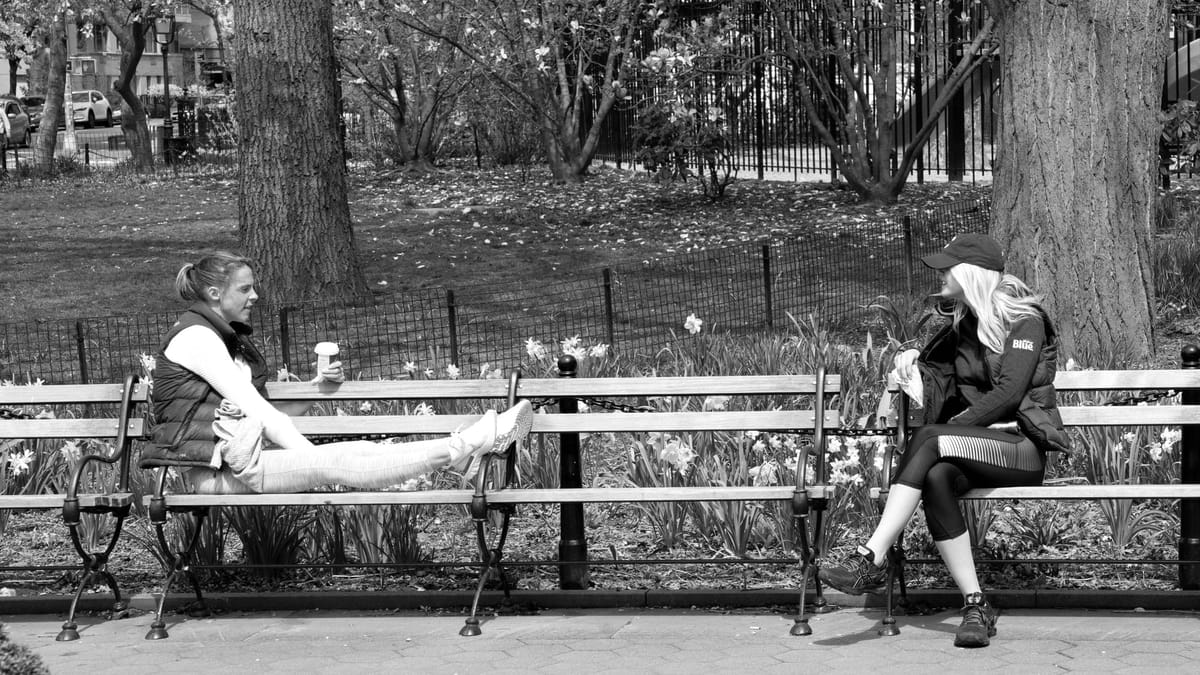It's 2025. Has France’s #MeToo Moment Finally Arrived?
France has a long tradition of protecting powerful men accused of sex crimes. Feminists are mixed on whether that’s about to change.

The sexual assault trial of the actor Gérard Depardieu which took place in Paris last week, has been hailed in the press as yet another moment of cultural reckoning for France.
The timing, on the heels of the historic rape case—yes, we’re talking about the Pelicot case, of course—couldn’t be more apt. But France has a long tradition of protecting powerful men accused of sex crimes. And despite widespread media attention, feminists are skeptical about whose voice will be heard and who will be believed when it comes to Depardieu.
“I don’t think we can ever say that France has had its #MeToo movement,” said Sarah McGrath, CEO of Women for Women France, a nonprofit that defends the rights of women subjected to gender-based violence. “We've had a few sort of attempts…but we are still in a position where a man’s reputation and his livelihood and his career are going to be protected before we believe victims and before we put the voices of victims and their stories forward.”
The trial concerns charges that Depardieu groped two women on set while shooting “Les Volets Verts” (The Green Shutters) in 2021. But there have been many more allegations than this. Since 2007, more than 20 women have alleged that he raped or assaulted them. Six filed charges, but Depardieu’s trial last week is the first time that an accusation against him has ended up in court.
At least several years on from #MeToo, “power no longer means impunity,” said Marie-Charlotte Garin, a politician and a member of the French political party, Les Ecologistes. She is also is one of the sponsors of a bill to add the idea of consent to French rape law which would redefine rape as pentration without consent. “Women have spoken out openly and justice must follow.”
‘Part and Parcel of Their Genius’
The current case against Depardieu involves a woman identified only as Amélie, a 54-year-old set decorator who said that Depardieu trapped her between his legs, groped her, and made lewd comments; and a second woman, Sarah, a 34-year-old assistant director who said Depardieu touched her breasts and buttocks on multiple occasions. At the time of the alleged assaults, Depardieu was already under formal investigation for raping the then-22-year-old actor Charlotte Arnould at his home on two occasions in 2018. Authorities have not yet decided if they will bring the Arnould case to trial.
Depardieu has denied all the allegations.
'A Free Pass'
France has long been willing to give a free pass to prominent writers, directors, artists, and actors, whose sexual misconduct is seen as an excusable element of their artistic temperament, part and parcel of their genius. Roman Polanski, who was convicted in the U.S. of raping a 13-year-old but remains revered in France is just one example. That same tolerance had been extended to Depardieu.
“The whole world didn’t want to see it because he’s a good actor,” said Blandine Deverlanges, head of the feminist group Les Amazones d’Avignon. But “you must separate the work, the man from the artist.”
“The whole world didn’t want to see it because he’s a good actor. But you must separate the work, the man from the artist.”
Because “he’s a giant of the cinema, he represents something of French culture, the old world, and so on,” there’s “this patriarchy where certain behaviors are excused as just flirting, just being libidinous, exuberant,” explained Ouarda Sadoudi, president of Home, an organization that houses and supports female victims of violence and a founding member of Popular Feminism.
Video Evidence
That became more difficult to do after the public witnessed disturbing footage of Depardieu: In 2023, a documentary aired on French television showing Depardieu, during a trip to North Korea, making lewd and sexist remarks about a 10-year-old girl riding a horse. France’s culture minister at the time, Rima Abdul Malak, said she was “disgusted” by his comments, but President Emmanuel Macron condemned what he deemed a “manhunt” and said he is a “great admirer” of Depardieu, who “makes France proud.”
Macron may have defended his national hero, but the documentary changed the public’s perception of Depardieu. “If it hadn't been for this video, I don't think the victims would have been heard and the case publicized in the same way,” said Sadoudi.
In this sense, the Depardieu trial mirrors that of Dominique Pelicot, in which video evidence of Pelicot and scores of other men raping or sexually assaulting Gisèle Pelicot while she was drugged and unconscious resulted in all the defendants being convicted. But these cases also illustrate the weakness of a system that often dismisses women making accusations of sexual assault unless, like Gisèle Pelicot, they are “perfect” victims or there is irrefutable evidence—a rarity in rape cases.
For her part, Sadoudi doesn’t think that the Pelicot trial has materially changed the French public’s view of rape or changed how sexual assault is handled by the justice system, but she does see how Gisèle Pelicot, who used her real name and demanded that her trial be open to the public, has emboldened women who have experienced sexual assault to come forward. Sarah, the assistant director on the movie set, and one of the plaintiffs in the current court case, cited Gisèle as her inspiration when she recently gave an on-camera interview, the first time she had shown her face.
Going After the Victim
But the Depardieu trial also exposes the ways in which the Pelicot trial failed to change French culture. While most of the more than 40 defense lawyers for the men accused of raping Gisèle Pelicot refrained from attacking her personally, which is often what happens in French rape trials—as McGrath explains it, it’s often “the victim who is on trial” with their credibility and their past “completely picked apart on the stand”—that restraint was very much absent in the Depardieu courtroom.
Depardieu’s lawyer, Jeremie Assous resorted to well-worn sexist tropes, saying the alleged victims were “hysterical,” “liars,” were working for the cause of “rabid feminism,” and were only pressing charges because they wanted media attention.
Court officials did nothing to curtail Assous’s rant, but 200 of his fellow lawyers penned an open letter, urging the judiciary to fight sexism in the courtroom. The letter said that Assous had exceeded “even the most generous interpretation of the right to defend” by using “sexism and misogyny to his heart’s delight” in order to discredit the plaintiffs and their attorneys.
The letter also denounced the "complete silence" of court officials in the face of Assous's remarks and noted that, while the two women’s legal teams had complained to the bar association, they had received no response. "A judiciary that silently tolerates sexism…is not up to the challenges of this day and age," the letter said.
"When someone’s car is stolen, we don’t shout at them or blame them. We don’t say, ‘Well, you once drove a Ferrari, so of course it got stolen.’ We want to shift toward a culture of consent. That’s the key.”
Garin, the politician, said that she was “stunned” by the aggressiveness of Assous’s defense. “We need to change how victims are treated in court,” she said. “They should be treated with respect throughout the process. When someone’s car is stolen, we don’t shout at them or blame them. We don’t say, ‘Well, you once drove a Ferrari, so of course it got stolen.’ We want to shift toward a culture of consent. That’s the key.”
Feminists say that the real test of whether attitudes in France are, at long last, beginning to change will be the verdict for Depardieu, expected to be delivered by the panel of three judges next month. Prosecutors have asked for an 18-month suspended sentence and a fine of 20,000 euros ($21,500). The maximum penalty is five years in prison and a fine of 75,000 euros ($80,600).
A guilty verdict would send a signal that France is moving in the right direction, “provided there is a real punishment,” Deverlanges said. “It would show that no man can behave like that, that they’d all be liable to be prosecuted. That would be the end of impunity.”











